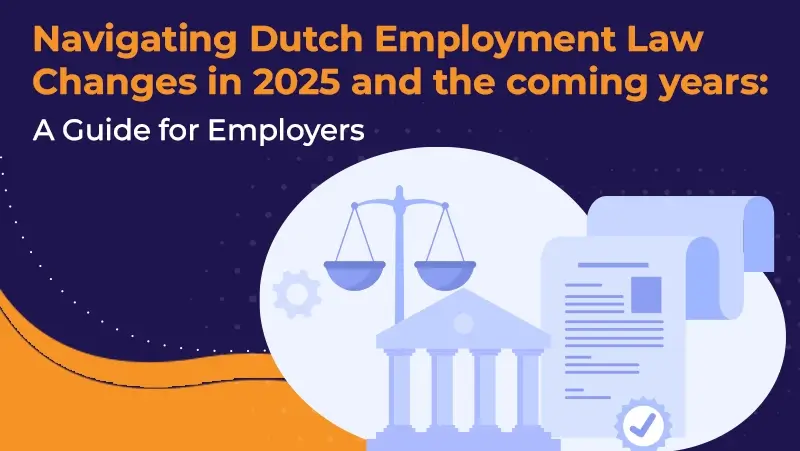Navigating Dutch Employment Law Changes in 2025 and the coming years: A Guide for Employers

An article By Tina Evans, Founder of Blue Lynx
As we approach 2025, the Dutch employment landscape is set to undergo significant transformations. Staying informed is crucial for employers to ensure compliance and to maintain effective workforce management. Here's an overview of the key changes scheduled for the coming years:
Stricter Certification Requirements for Employment Agencies
The Dutch government is implementing stringent agency worker regulations to combat malpractice and ensure fair treatment of workers. All employment agencies will be required to obtain certification by January 1, 2025. Concerns have been raised about the feasibility of completing all inspections in time, prompting discussions about potential transitional arrangements. ABU
Blue Lynx has held the required certification NEN 4400-1 for more than 10 years - BLUE LYNX - NORMERING ARBEID - NEN 4400-1. We are here to help you whilst navigating this complicated landscape. You have the guarantee that we are fully compliant with the Dutch Labour Law.
Enforcement on False Self-Employment
Starting January 1, 2026, the Dutch Tax and Customs Administration (Belastingdienst) will intensify enforcement against false self-employment (schijnzelfstandigheid). Companies misclassifying workers as self-employed (zzp’ers/freelancers) when they function as employees risk penalties and additional tax assessments. A one-year transition period allows employers and workers to rectify such situations without incurring fines. PWC
Changes in Tax Measures Affecting Employment
The 2025 Tax Plan introduces several measures impacting employment, including adjustments to income tax brackets and rates, modifications to the energy tax, and changes affecting the taxation of employee benefits. Employers should review these tax measures to understand their implications on payroll and employee compensation. PWC

Adjustments to the 30% Ruling for Expatriates
The popular 30% tax ruling for expatriates, which offers a significant tax break for highly skilled international employees, is undergoing changes.
- From January 1, 2027, the maximum tax-free allowance will be reduced from 30% to 27% of the gross salary.
- Salary thresholds for eligibility will increase to €50,436 for standard cases and €38,338 for younger employees with a master's degree (based on 2024 figures).
- A transitional arrangement ensures that employees using the 30% ruling before 2024 can maintain their current benefits until the end of their ruling period.
This is a reminder for employers to revisit their expatriate policies and ensure they remain attractive to international talent.
Implementation of the Future Pensions Act (Wet toekomst pensioenen)
The Future Pensions Act introduces a shift from defined benefit schemes to defined contribution schemes with age-independent flat-rate premiums. Employers are required to transition to these new pension schemes by January 1, 2028. It’s important to note that while pensions are not currently a mandatory benefit for direct employees, new regulations will soon require all companies to offer a pension plan. The Act also mandates changes to survivor's pensions and necessitates adequate compensation for employees adversely affected by the transition. PWC
Changes in the Collective Labour Agreement (CLA) for Temporary Agency Workers
The ABU and NBBU have negotiated a new Collective Labour Agreement for Temporary Agency Workers, effective from April 1, 2024, to January 6, 2025. This agreement aims to further equalise employment conditions between temporary and permanent workers. Key provisions include adjustments to wage structures and the implementation of a price-quality system for housing costs deductions for labour migrants. ABU and NBBU changes
Increase in Minimum Wage
The statutory minimum wage in the Netherlands adjusts twice a year – in January and July. As of 1 January 2026, adults over the age of 21 will earn a new minimum hourly wage of €14.71 gross, with corresponding adjustments for younger workers. This change will also impact the starting salaries in the wage tables of the Collective Labour Agreement for Temporary Agency Workers, necessitating adjustments to ensure compliance.

Closing Thoughts
At Blue Lynx, we understand that adapting to these legislative changes is not just about compliance -it’s about creating sustainable, forward-thinking workplaces. The start of 2025 is an ideal moment to revisit contracts, policies, and processes to ensure your business is ready for the future.
The constant changes and complexity of employment regulations can leave employers with more questions than answers, making it difficult to focus on core business operations. This is where a strategic partner like Blue Lynx can make all the difference. Through our expert contracting service, we manage the entire hiring process and ensure compliance with all legal requirements, allowing you to remain focused on what drives your success.
